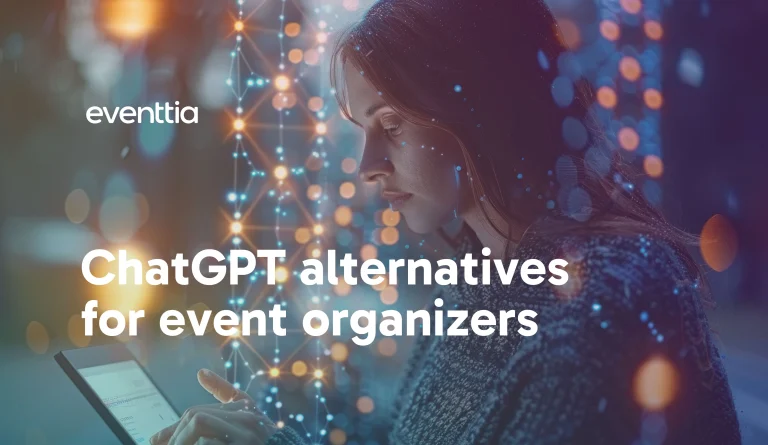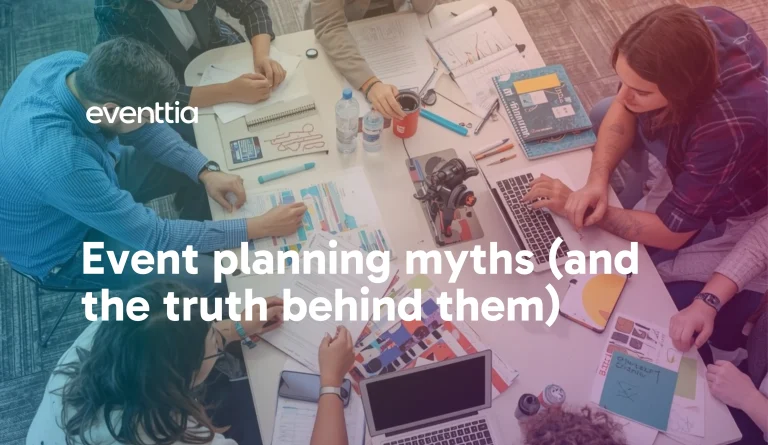ChatGPT has become something of a default for many organizations seeking ways to automate content creation, customer service, and internal workflows. As of 2025, about 49% of companies are using ChatGPT for at least one core business workflow, and 93% of those report plans to increase their use.
However, ChatGPT isn’t the only tool out there, and others may have functionality that’s more suitable for event planners, or integrations that work more effectively with your company’s existing tech stack. In this article, we’ll explore the best ChatGPT alternatives for the event industry, and how to make the most of them.
Why you might want to find alternatives to ChatGPT
ChatGPT for events isn’t always the perfect fit, especially for event planners who have specialized needs, fixed budgets, or strict privacy concerns. Here are some of the main reasons why you might want to look beyond ChatGPT.
More free features
Many small or mid-sized event teams, or those organizing occasional events, may not want to pay monthly subscription fees. While ChatGPT offers free and paid tiers, many alternatives provide more usable features in their free plans, like more generous limits, fewer constraints, or fewer locked features.
As events grow, you often need more usage, more seats/users, and more customizations. With ChatGPT, scaling up can mean moving into more expensive plans. Alternatives may offer more scalable tiering or more generous free quotas so you can do more without immediately jumping to a premium plan.
Helpful features for event specialists
Event planners often have very specific tasks: generating session descriptions, crafting sponsorship proposals, creating personalized messages for different attendee segments, handling real-time updates, etc. Some ChatGPT alternatives are designed or optimized for event-specific workflows (e.g. content tailored to events, integrations with event data, templates built for scheduling, speaker management).
Certain tools may also provide better support for multilingual content, or better control over tone, style, or format (presentations, brochures, formal vs informal). If your event needs very polished content in multiple languages or precise branding, some alternatives may give you better control.
Tech integrations
Some ChatGPT usage is standalone, but integrating it deeply with your stack (e.g. automatically pulling registration data, sending attendee-reminders, syncing segments) may require workarounds or custom dev. Alternatives with built-in integrations or APIs might be easier.
Planning, promotion, attendee communication, feedback, and post-event follow-ups all benefit when tools “talk” to each other. If your alternative supports Zapier, native API connectors, or direct plug-ins with your event tech stack, it can reduce manual steps and errors.
Privacy, security, and compliance concerns
Events often involve sensitive attendee data, like personal info, payment data, or speaker contracts. Depending on your region or your organization’s policies (e.g. GDPR, CCPA, or other data privacy laws), you may need tools with strong data protection or strict controls over how user inputs are stored, used, or retained.
When using generative tools, knowing who owns the output, how copyrighted content is handled, and whether there’s any risk of inadvertent reuse of copyrighted data are big concerns. Some alternatives may offer clearer terms around IP, or have features like content watermarking or audit/logging of creation sources.
The best ChatGPT alternatives for event professionals
ChatGPT is often the default choice, but it’s far from the only option. Depending on your needs, several alternative AI assistants can be better suited for event planning. Here’s a list of the most popular alternatives, and how they can be used in the event industry.
Tool | What It Does | Pros | Cons | Best Use for Events | Pricing |
Perplexity | AI search assistant that pulls real-time web data and cites sources. | Accurate, up-to-date answers; source citations. | Not as strong for creative writing. | Researching venues, vendors, or industry trends with reliable sourcing. | Free; Pro plan $20/month. |
Jasper | AI content creator tailored for marketers. | Templates for ads, blogs, and emails; strong branding control. | Paid plans only; not ideal for research. | Crafting event promotions, sponsor proposals, and social media campaigns. | From $59/month. |
Claude (Anthropic) | Conversational AI focused on ethics and safety. | Strong privacy principles; interprets long docs well. | Sometimes overly cautious. | Drafting contracts, attendee communications, or sensitive event copy. | Free tier; Pro $17/month. |
YouChat | AI chatbot integrated into You.com search engine. | Fast, concise, source-linked answers. | Less advanced creative capabilities. | Quick fact-checking and competitor/event research. | Free, $15/month paid plan available |
Microsoft Copilot | AI assistant embedded in Microsoft 365 apps. | Natively integrated with Word, Excel, Teams, Outlook. | Requires Microsoft subscription. | Automating attendee lists in Excel, drafting emails in Outlook, summarizing meeting notes. | Included with Microsoft 365 ($20/user/month for enterprise). |
Chatsonic | Conversational AI with real-time data and voice/image capabilities. | Voice and image generation; integrates with Google Search. | UI less polished than competitors. | Creating multimedia content for event promotions and interactive chatbots. | From $39/month. |
Google Gemini | Advanced multimodal AI (successor to Bard). | Handles text, image, and code; strong integration with Google apps. | Still developing; occasional factual errors. | Generating marketing visuals, analyzing attendee data, or writing content. | Free; Pro tier $20/month. |
Zapier Agents | AI-powered automation integrated into workflows. | Automates repetitive tasks; connects 6,000+ apps. | Requires setup; best for advanced users. | Automating registration, syncing CRMs, sending attendee reminders. | Free; Paid from $50/month. |
NeevaAI | AI search engine focused on ad-free, private answers. | Privacy-first; accurate source-based results. | Company scaled down in 2023, limited growth. | Research tasks where data privacy matters. | Custom – demo required |
Meta AI | Meta’s conversational AI integrated into Facebook/Instagram. | Strong social integration; free. | Still limited in enterprise settings. | Engaging audiences on social media pre- and post-event. | Free, possible paid plans in future |
Character.ai | Chatbots that simulate personalities and characters. | Fun, interactive, customizable bots. | Less formal; not for professional tone. | Creating event mascots, gamified attendee engagement, or virtual assistants. | Free; premium subscription 10/month. |
Mistral AI | Open-weight generative AI models focused on efficiency and transparency. | Lightweight, high-performance; open-source friendly. | Still building ecosystem; limited tooling compared to OpenAI/Anthropic. | Powering custom AI assistants, research tasks, or integrating into event apps needing flexibility. | Free open models; enterprise support and hosting available (pricing varies). |
Perplexity
What it does: Perplexity is an AI-powered “answer engine” that combines conversational AI with real-time web search. It provides responses with source citations (i.e. it pulls from the web) rather than just relying on a fixed language model.
Pros:
- Real-time, up-to-date answers pulled from the web
- Citations help with transparency and fact-checking
- Freemium model lets you use many features without a full subscription
Cons:
- Because it draws from online sources, content quality can vary depending on source reliability
- May produce inconsistent style or tone (less “brand voice–aware”)
- Less control over prompt tuning or customization compared to more specialized models
How to use it for events:
- Look up venue regulations, local catering laws, or competitor event trends
- Quickly gather recent content, bios, or industry data to inform keynote scripts or questions
- Use its output as a starting point (with citations to verify) for blog posts, newsletters, or promotional materials
Jasper
What it does: Jasper is a content-generation platform built for marketing workflows. It offers templates for emails, landing pages, blog posts, social media, and more. It’s designed to help non-writers create polished marketing content quickly.
Pros:
- Tailored to marketing use cases, not just general conversation
- Style and tone controls built in (you can set brand voice)
- Collaboration features and team workflows
Cons:
- Can feel formulaic if you overuse templates
- More expensive than general-purpose models for similar token usage
- Outputs should still be reviewed for possible factual errors
How to use it for events:
- Create promotional emails like save-the-dates, reminders, and follow-ups with consistent brand tone
- Draft social media posts or ad copy for events or sponsors
- Generate content for event websites, landing pages, or program descriptions
Claude
What it does: Claude is an AI assistant designed to be safer, more controllable, and more aligned to user goals. It emphasizes guardrails and has a reputation for being better at avoiding toxic or biased content.
Pros:
- Reputation for more “gentle” or cautious output, fewer risky hallucinatory errors
- Good for sensitive or regulated domains
- Strong at reasoning-style tasks (summarization, analysis)
Cons:
- Output can be more conservative (less adventurous)
- May be slower or more constrained than some “aggressive” models
- Fewer integrations or marketing-specific templates than niche tools
How to use it for events:
- Compare a list of venues or vendor proposals
- Draft formal documents like contracts, speaker agreements, or event budget proposals
- Use it to audit other AI output (e.g. feed ChatGPT content into Claude for fact-checking)
YouChat
What it does: YouChat combines conversational AI with search, giving you answers while also citing web sources. It is often integrated directly into search engines.
Pros:
- Real-time web data
- Can be a quick “chat + search” hybrid
- Good for fact-based or current-events queries
Cons:
- Less robust in creative generation compared to dedicated content engines
- The user experience may be more limited (fewer controls)
- Outputs may need refinement
How to use it for events:
- Look up attendee trends, industry news, or competitive events
- Use it to validate facts or find up-to-date links and references
- Combine its results with another generation tool to shape content
Microsoft Copilot
What it does: Copilot (in Microsoft 365, Windows, etc.) is an AI assistant integrated with Microsoft apps, including Word, Excel, PowerPoint, and Outlook. It can draft, summarize, extract, and repurpose content within your documents and workflows.
Pros:
- Native integration with tools planners already use, like Word, Excel, and PowerPoint
- Streamlines in-context generation without requiring copy+paste
- Good for productivity and document workflows
Cons:
- Bound to the Microsoft ecosystem and less flexible outside
- Premium features may require higher licensing tiers
- Output sometimes needs editing or tuning
How to use it for events:
- Draft proposals, agendas, speaker emails, and presentations directly inside PowerPoint or Word
- Summarize large documents like vendor contracts or meeting notes
- Generate content based on data in Excel for agendas, attendee lists, etc.
Chatsonic
What it does: Chatsonic is a conversational AI built on top of large language models with added features like real-time news, images, voice input, and more. It’s a ChatGPT-style interface with extra bells and whistles.
Pros:
- Can integrate recent information or news (helps avoid outdated responses)
- More flexible input modes (images, voice)
- Good for conversational tasks
Cons:
- May have limitations in depth or consistency
- Feature set sometimes overlaps heavily with other assistants
- Quality varies depending on prompt and task
How to use it for events:
- Use for attendee FAQs or chatbot-like interactions
- Generate dynamic Q&A content, press releases, or updates
- As a creative brainstorming partner for session titles or agenda themes
Google Gemini
What it does: Gemini is Google’s advanced AI model (successor to Bard) that integrates multiple modalities (text, images, reasoning) and is designed to work smoothly within Google’s ecosystem.
Pros:
- Access to Google’s data, search, and tools
- Multimodal capabilities (text + image)
- Strong performance on reasoning/knowledge tasks
Cons:
- At times, more cautious in creative or speculative output
- Ecosystem lock-in (works best with Google services)
- May require premium version for full features
How to use it for events:
- Draft event visuals + text (e.g. concept boards with image prompts + description)
- Research attendee personas, trends, or industry insights
- Use in planning materials, integrating with Google Slides, Docs
Zapier Agents
What it does: Zapier Agents is a hybrid of AI + automation. You design agents (chatbots) that connect your apps (e.g. CRM, event registration, email tools). The agents can pull data, respond, automate tasks, and act like mini assistants.
Pros:
- Deep integrations with thousands of apps
- Customizable tasks and workflows
- Can run autonomously in the background
Cons:
- Requires setup and planning of agent logic
- Less “natural conversational” feel, more task-driven
- Some complexity in managing triggers, actions, and error cases
How to use it for events:
- Automate responses to your event registrants
- Sync data between systems (registration → CRM → email tool)
- Create agents to monitor and trigger reminders, alerts, or content pushes
NeevaAI
What it does: Neeva is a search and AI interface built for privacy and ad-free browsing. It provides AI-powered answers without ads, focusing on user control and clarity.
Pros:
- Cleaner, privacy-focused interface
- Good at factual, research-based tasks
- Ad-free, minimal distractions
Cons:
- Not optimized for creative content generation
- Less polished in conversational flair
- May lack advanced templates or marketing features
How to use it for events:
- As a research companion to find regulations, venue data, local market insights
- To verify statistics, get real-time facts, or build reference lists
- Combine its facts with another content generator to produce polished output
Meta AI
What it does: Meta AI (from Meta / Facebook) is a conversational AI that integrates with Meta’s platforms and research models. It may be used for content generation, chat, and cross-platform publishing.
Pros:
- Good synergy with social media and the Meta ecosystem (Facebook, Instagram)
- Strong at conversational outputs and multi-turn engagement
- Free access for many users
Cons:
- Less business-oriented features or templates
- Privacy or policy constraints within the Meta environment
- Output may require polishing for professional tone
How to use it for events:
- Draft social posts, ad copy, engagement content for Meta platforms
- Use it for conversation flows (e.g. Facebook Messenger bots)
- Brainstorm interactive social campaigns or live content
Character.ai
What it does: Character.ai lets you create conversational agents (“characters”) with distinct personalities, trained in specialized domains.
Pros:
- Highly customizable persona and tone
- Good for interactive or playful engagement
- Interesting way to engage attendees or simulate “characters” (e.g. virtual mascot)
Cons:
- More niche than a reliable business assistant
- Less structured for document-level generation or bulk tasks
- Requires careful setup to avoid hallucinations
How to use it for events:
- Create a virtual “event guide” or chatbot persona that answers attendee questions
- Use as a fun engagement tool at your event
- Simulate conversations for training or rehearsal (e.g. a “mock networking partner”)
Mistral AI
What it does: Mistral AI develops open-weight generative AI models designed to be lightweight, efficient, and highly adaptable. Unlike many closed systems, Mistral emphasizes transparency and flexibility, making its models accessible for research, customization, and enterprise integration.
Pros:
- Open-source–friendly; models can be self-hosted or fine-tuned
- Lightweight and high-performance, optimized for speed and efficiency
- Transparent approach with accessible research papers and model weights
- Strong appeal for organizations that want control over their AI stack
Cons:
- Ecosystem is still maturing compared to OpenAI or Anthropic
- Limited built-in tooling; requires more technical expertise to deploy
- Enterprise support and hosting solutions still evolving
How to use it for events:
- Power custom AI assistants for event staff or attendee support
- Enable on-site chatbots that can run offline or with tailored data
- Support data analysis tasks, such as attendee feedback clustering or trend detection
- Offer flexible integrations with event apps that need efficiency and customization
Key takeaways: Combining the right AI tools with the right event platform
As powerful as ChatGPT is, it isn’t always the perfect fit for every event professional. Alternatives like Jasper, Claude, or Perplexity may provide better features for content creation, privacy, or research, while others like Zapier Agents and Microsoft Copilot shine in automation and integrations.
While AI tools can help you create, automate, and innovate, Eventtia provides the foundation to manage the entire event lifecycle: registration, marketing, communication, data collection, and reporting. By pairing Eventtia with the right AI assistants, you can streamline operations and elevate attendee experiences.
Schedule a demo to learn more about managing and measuring your events with Eventtia.
Source:
Overall:
"The excellent service and agile approach to solving our requirements make this a reliable solution we can count on."
Alejandra Preciado
Acoplásticos
ChatGPT alternatives for events: FAQs
Why should event professionals consider alternatives to ChatGPT?
While ChatGPT is a powerful tool, alternatives may offer more free features, better integrations with event management tools, or AI built specifically for marketing and content creation. Depending on your workflow, another platform could save you time and money.
What’s the best ChatGPT alternative for creating event marketing content?
Jasper is often the top choice for marketers because it offers templates for emails, social posts, and landing pages. Canva and Runway also shine for visual assets like graphics and promotional videos.
Which AI tool is best for real-time, accurate event research?
Perplexity and YouChat are great options because they cite sources and pull in live web data. This is especially useful when researching local regulations, vendor options, or current industry trends.
Are free AI tools reliable enough for event planning?
Free tools like Google Gemini (basic version), and Meta AI can be very useful for quick research, brainstorming, or small-scale content creation. However, for professional marketing campaigns or sensitive communications, it’s usually best to use paid versions for more control and accuracy.
What’s the best AI alternative for generating event visuals or videos?
Runway, Luma Dream Machine, and Canva are excellent for creating eye-catching visuals. For video, Synthesia and Descript let you make professional-quality content without needing advanced editing skills.
Which AI tool is safest for handling sensitive event data?
Claude is designed with strong safety and privacy principles, making it a good option when working with sensitive communications, contracts, or attendee data.
Do AI tools replace human event planners?
No, you don’t need to worry about that. AI tools can handle repetitive tasks, speed up research, and provide creative drafts, but event planning still requires human judgment, creativity, and relationship-building.
Can AI tools help with attendee engagement during an event?
Yes, tools like Character.ai or Meta AI can power interactive chatbots, virtual event guides, or even playful event mascots to engage attendees in a fun and memorable way.
How do I choose the right ChatGPT alternative for my event?
Start by clarifying your needs: Do you need better marketing content, real-time data, visual assets, or strong integrations with event tech? From there, match the tool to your workflow. For example: Jasper for content, Perplexity for research, Runway for video, or Zapier Agents for integrations.
Discover how Eventtia helps world-leading brands digitize and scale their events
Learn moreShare





